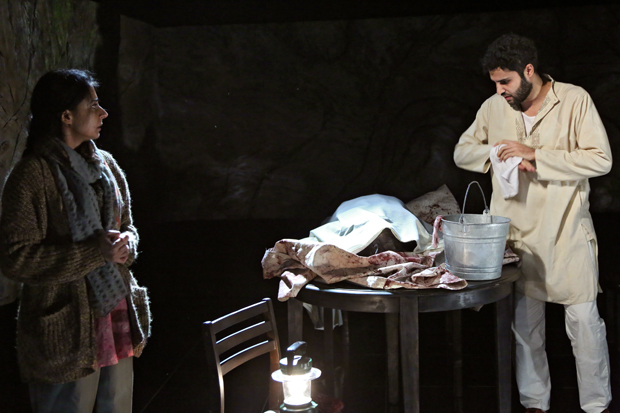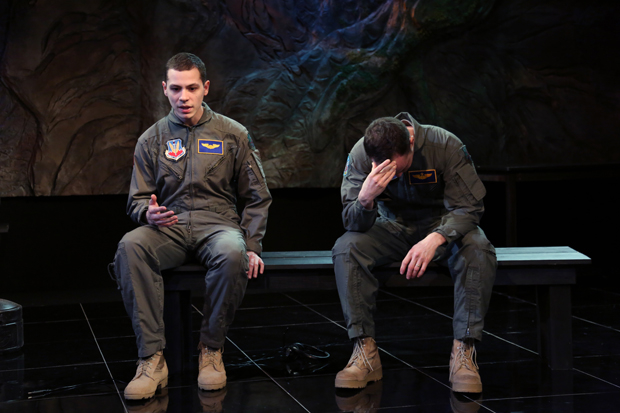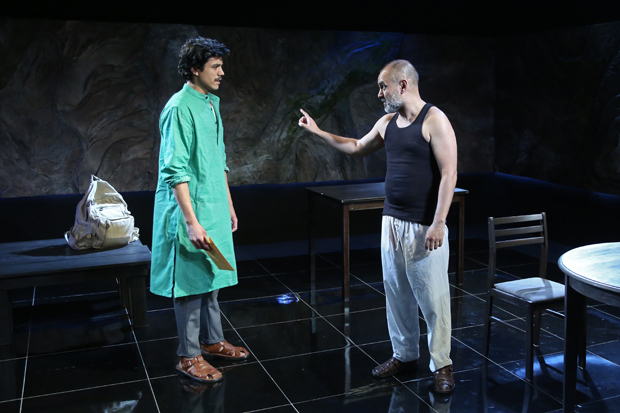American Drones Stalk a Pakistani Family in Against the Hillside

(© Gerry Goodstein)
Just a reminder: The war in Afghanistan is still on. And as America's relationship with Pakistan deteriorates, the drone strikes our Air Force carries out along the border between the two countries will become even more unpopular than they already are. Noting that, Sylvia Khoury's Against the Hillside would seem to arrive at Ensemble Studio Theatre at just the right time. It's about the deleterious effect drones have not just on the civilians in proximity to their targets, but also on the stateside pilots who operate them. Unfortunately, Khoury's insights on this matter are about as deep as Pakistan's Hanna Lake.
Matt (a realistically mumbly Jack Mikesell) is a drone pilot stationed outside of Las Vegas. He spends much of his day in front of a screen that displays live images gathered by a drone hovering high above Waziristan. He specifically enjoys watching married couple Sayid (Babak Tafti, eyes aglow with unspoken dread) and Reem (Mahira Kakkar, wearing her angst on her sleeve). Reem doesn't want to raise their son under the constant hum of lethal American drones. Sayid insists that they can adapt to the situation — that's what humans do. Still, Matt is having trouble adapting to the prospect of war as a day job, and his obsession with Reem is starting to negatively affect his relationship with his wife, Erin (Caroline Hewitt). Even though Reem is thousands of miles away, she feels intimately close to him.

(© Gerry Goodstein)
Against the Hillside invites comparisons to George Brant's Grounded, which is also about a Nevada-based drone pilot and covers similar emotional territory. Unlike that very personal solo play, Khoury pulls back the camera to show the watched, rather than just the watcher. Unfortunately, her efforts to illuminate the lives of her subjects mostly leave us in the dark.
In Khoury's world, everyone speaks in the same haltingly polite-to-passive-aggressive manner that has become a hallmark of the American upper-middle class. When Sayid mentions that he's noticed a look of worry on Reem's face, she retorts, "That’s extremely condescending, Sayid." Later, when she makes a comment that he considers out of bounds, he mopes, "I don’t deserve that." It's Pakistan à la Portlandia.
The plot similarly strains credulity when the cousin (Mohit Gautam) with whom Reem absconds to Karachi returns to Waziristan and is received by his father (Rajesh Bose, who brings unexpected layers to both of his roles) with a resigned shrug and a fistful of cash. People are murdered in Pakistan for far less. We wonder if the scenes in Pakistan are in Matt's imagination as he projects his own issues onto the nameless people he has been assigned to trail, but no: The production makes it clear that this is an earnest yet misguided attempt to represent real people.
Director William Carden indulges in strangely extended transitions for a stage that has been designed to make them seamless. The stone panels of Jason Simms's set seem meant to evoke the mountainous border region between Pakistan and Afghanistan, but they could alternately look handsome in the lobby of a casino. Similarly, Barbara Samuels's multicolored track lighting, which pulses with the driving thud of Shane Rettig's interstitial music, wouldn't feel out of place in a hip new shisha lounge. The only tangible difference between the American and Pakistani characters is represented in Sydney Maresca's culturally aware costumes, but Sayid still comes off like a sensitive hipster in a kurta.

(© Gerry Goodstein)
It is possible that by presenting this relatable but unrealistic portrait of life in rural Waziristan, Khoury hopes to help New York audiences sympathize with people on the other side of the world who live in constant fear of flying death robots purchased by our tax dollars. But by papering over our differences, Khoury also obfuscates the real disparities in economics, education, and culture that divide people like Matt from people like Reem. Taken to its logical conclusion, the play implies that Reem and Sayid are somehow complicit in their plight, and ought to just move. Rather than an incisive look into an unfamiliar part of the world, Against the Hillside merely recycles the bootstrap myth in an exotic locale. It's a disappointing use of a topic brimming with dramatic potential.










